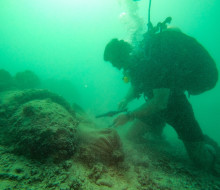
Second World War-era bombs in Vanuatu made safe by Navy divers
26 June 2024
Unfortunately you are viewing this website on an outdated browser which does not support the necessary features for us to provide an adequate experience. Please switch to a modern browser such as latest version of Google Chrome, Mozilla Firefox, Apple Safari or Microsoft Edge.
Ngā mihi nui
Corporal Toby Hutton learned the basics of soldiering on the parade ground but has since gained a raft of leadership skills and stays enlisted in the New Zealand Army despite now living in Sydney.
The 35-year-old combat engineer joined the Reserve Force in 2006.
“The NZ Army is a great grounder for leadership training. One of the first things you learn at basic training is parade drill, this is to produce a soldier who is proud, alert and obedient and it provides the basis for all teamwork.”
Corporal Hutton has enjoyed a successful military career, topping the class in a number of courses and earning a Chief of Army Commendation at the recommendation of a foreign military.
In his role as a combat engineer (or sapper), he, as part of a Troop, uses explosives to create or remove obstacles, build temporary bridges and handle small boats to take on water obstacles so his fellow soldiers can get about the battlefield.
Corporal Hutton works for Fulton Hogan and transferred from Auckland to Sydney earlier this year, where he is a site engineer.
“Fulton Hogan have been very supportive of my Reserve Force career. They have recognised the value in the development of the skills that the Reserve Force instills in its soldiers, and that they cross over into the civilian sector.”
Although being an Army Reserve Force Combat Engineer is different than a site engineer, there are elements that are similar, and it was his love of big machinery, construction and variety that drew him to both jobs.
Corporal Hutton travels back to New Zealand for Army training when he is able.
Although it is a big commitment to travel from Sydney, he focuses on specific exercises and any courses he may be able to complete while visiting family.
He’s also able to keep his hand in through attending training online and working remotely.
Self-development is ongoing while serving within the NZ Army, and leadership skills are trained throughout a soldier’s and officer’s career.
Corporal Hutton’s latest leadership training was his Promotion All Corps Territorial Force Senior Non-Commissioned Officer Course based in Waiouru Military Camp, New Zealand.
The two-week course is designed so instructors coach students through a variety of military scenarios, primarily focused on leadership training.
Training is done both in and out of the classroom and includes drill, leadership theory, problem solving, mentoring, practically applying the leadership theory to achieve a mission with a cohesive team and planning a training event.
Corporal Hutton was awarded the Regimental Award, for the person who displayed the highest regimental standards, dress and bearing throughout the course.
“It’s the experience of leading people through the hard times that really puts us to the test. It’s not uncommon for your training to be tested at minus four degrees on the Central Plateau at 4am, and that’s where leadership really happens.
“If you can lead successfully there, it certainly provides skills that will hold you in good stead in a corporate environment,” Corporal Hutton said.
Early in Corporal Hutton’s career, he was seconded to the secretariat for the US Army-led Pacific Armies Chiefs Conference, employed to transport VIPs.
He excelled, and it was noted that his bearing, professionalism, knowledge, courtesy and foresight into the needs of others was outstanding.
Bangladesh Chief of Army, General (Retired.) Iqbal Karim Bhuiyan offered to personally recommend him for a Chief of Army Commendation, which was awarded in 2014.
“I enjoy the challenges the Army gives me, and that it benefits many parts of my life, both personal and work. I was honoured to be recognised for a Chief of Army Commendation and it still remains a highlight of my Army Reserve Force career.”
Any Defence Recruiting enquiries can be directed to 0800 1 FORCE. Each Reserve Force company has its own training programme in line with its battalion’s training focus. Training typically occurs one weekend a month.